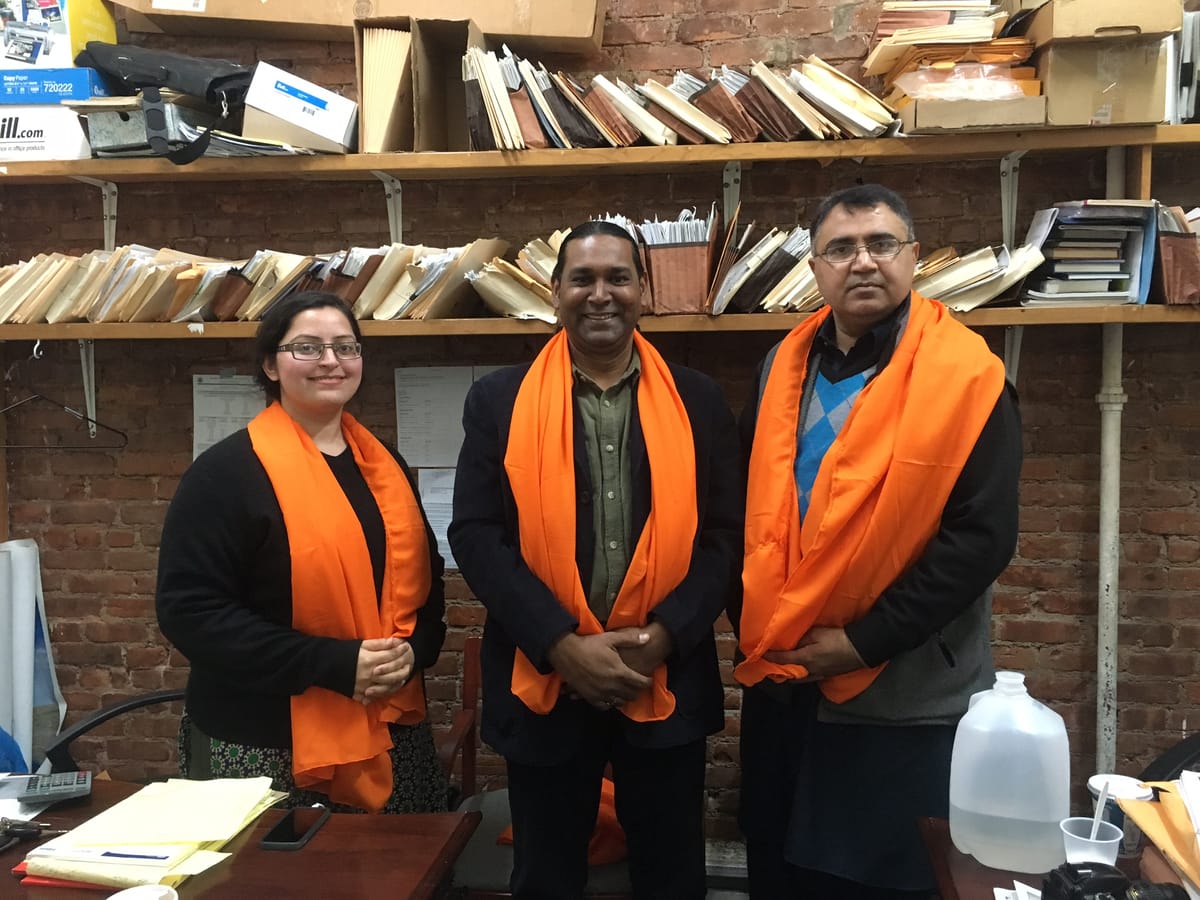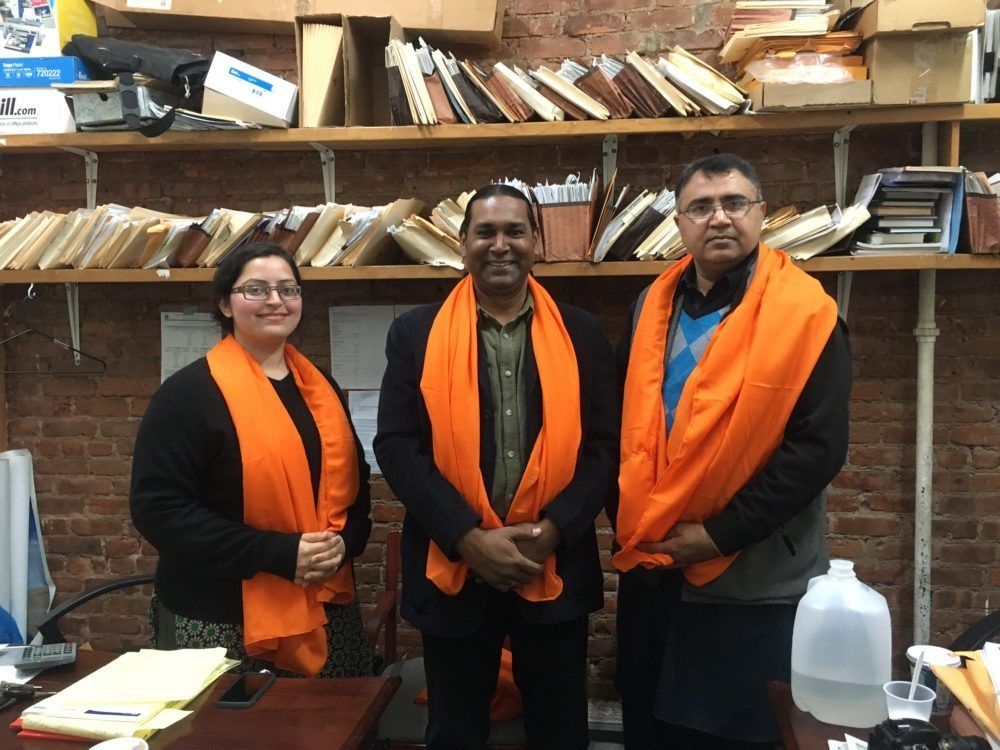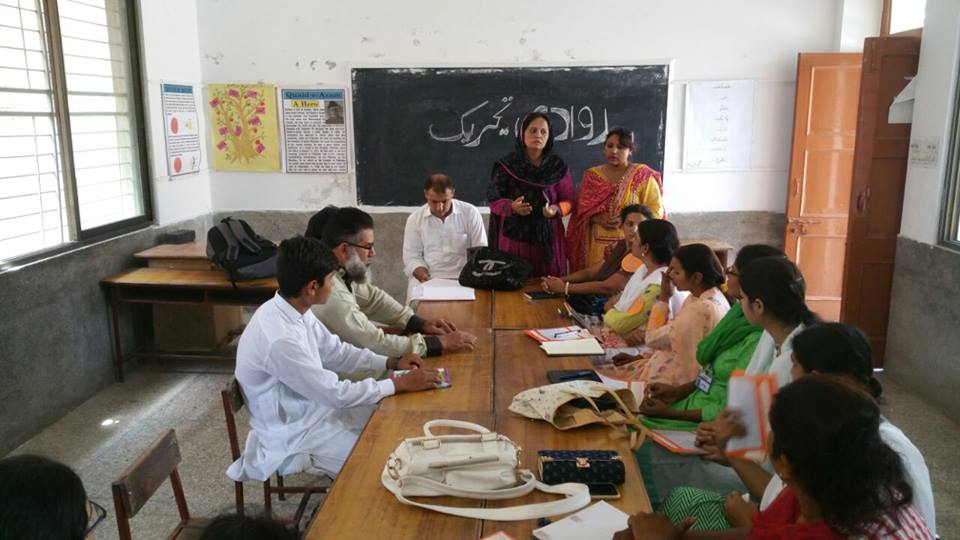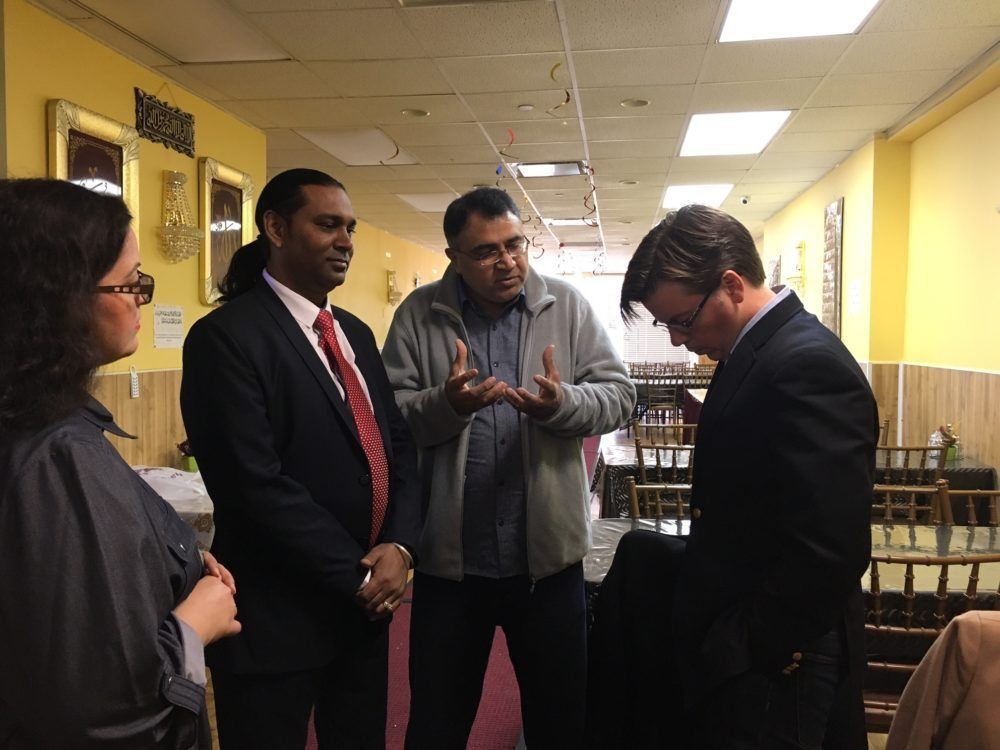Human Rights Defenders Bring Pluralism And Tolerance To Brooklyn’s ‘Little Pakistan’


Samson Salamat, a Pakistani human rights defender, is igniting a global movement to combat terrorism, a movement whose voice is reaching Brooklyn’s hotspot for Pakistani immigrants, ‘Little Pakistan.’
Salamat, founding director for Center for Human Rights Education, is also the chairman of Rwadari Tehreek, or “movement for pluralism”, a nonviolent social movement to rebuild diversity and equality in a nation co-opted by religious extremism.
In addition to Salamat, we spoke to Saba Ismail, a woman’s rights activist with Aware Girls, and local activist Shahid Khan about the decade-long “wave of intolerance and terrorism” in Pakistan, what it means to work for human rights in an Islamic Republic, and reverberations from the U.S. presidential elections.
Over the past decade, terrorism and religious militants have been on the rise in Pakistan, said Salamat, including a blast that killed 70 in Lahore in March, a suicide bombing at a hospital in southwestern Quetta this August, and a 2014 attack on a Peshawar school.
“Though we have lost almost 70,000 citizens from terrorism, when school children were targeted the whole nation went into shock,” said Salamat, referring to the bombing of a Peshawar army school that killed 132 children and 10 teachers. “It was a turning point,” Salamat said, leading to the State’s official counter-terrorism action plan in 2015. But the problem goes much deeper than promises from the state.
Some roots of intolerance in Pakistan
“The intolerance is nurtured in the society, it’s not just the extremist outfits but the overall society is intolerant. It’s been the state policy for decades,” said Salamat.
He spoke about the 1980s when the so-called Islamization began through martial law under General Muhammad Zia-ul-Haq, Pakistan’s president from 1978–1988. That was the time that militant organizations — including the Taliban and Muhajadeen — took root in Pakistan, said Salamat.
Salamat was drawn to this work after discrimination and attacks ravaged his own minority Christian community. “Whole settlements were burned, people belonging to minorities were burned alive, their worship places were attacked,” he said. But instead of lashing out in anger, Salamat took solace in nonviolent action that fosters dignity.
He names the strict enforcement of state religion as a seeding ground for discrimination, including ideas that women and religious minorities are second class citizens. “That’s embedded in the constitution. We feel that there was a syllabus change that helped to prepare the mindset of young generations that has now become intolerant,” he said.
Ismail also attributes the proliferation of Islamic militancy in Pakistan to the glorification of violence in formal education. “Schools teach that India is an enemy country rather than just a neighboring country. Our textbooks praise warriors or promoters of Pakistan’s nuclear weapons. They’re the heroes of our nation,” she said. (This curriculum-based intolerance is echoed in a 2014 US State Department report here).
“In Pashtun culture, it is common to hang weapons as a symbol of honor in the living room,” she said, leading to young boys and men equating weapons with power.
On the ground level, Ismail has seen generations psychologically stunted by the effects of violence. “People have seen bombings, and killings, they’ve lost loved ones. In [North West Pakistan], schools were torched and attacked, literacy rates plummeted, women aren’t allowed to vote, or even go out on their own or they’ll be lashed,” she said.
Bomb sites litter the streets with such frequency they become landmarks people use to give directions.
Young people in Pakistan are flocking to a nonviolent alternative by the millions and eschewing a militant agenda, Ismail said, but they aren’t getting the same kind of global attention.
A progressive social movement rises from the ashes
In 2015, Salamat and other human rights activists launched Rwadari Tehreek, which has grown into a leading social movement in Pakistan. Rwadari Tehreek promotes pluralism, dialogue, and religious diversity, on the nonviolent platforms of Martin Luther King, Badshah Khan, Gandhi, Nelson Mandela and others. The group includes volunteer activists, lawyers, teachers, artists, and religious scholars working to reform Pakistan’s constitution, ban hate speech, and end institutional discrimination.
The group uses social media and volunteer chapters spread throughout Pakistan’s provinces. The chapters hold trainings, inter-faith festivals, cultural programs, and political campaigns — reviving culture that was lost in the wave of Islamization. “Rwadari Tehreek is engaging diverse communities as stakeholders…[its] devotion to the spiritual principle of ‘peace within peace without’ makes it a truly native movement,” writes columnist Jamshed Iqbal.
The movement is building incredible momentum in Pakistan, where people tell Salamat, ”This is the right step, this is what we’ve been waiting for.”

This week, Salamat visited NYU and Gourmet Restaurant on Coney Island Avenue to encourage local activists groups. His U.S. visit also includes tours to cities, like Brooklyn, with a stronghold of Pakistan’s political influencers. In addition, Assembly Member Robert Carroll stopped by to address the activist group.

Challenges to the pluralist movement
The nonviolent movement faces many challenges, including misinformation promulgated by the state. “We get labeled as the Western spies and Kafir [infidels],” said Ismail. “The identity of Pakistan has been equated to the identity of Islam and the identity of Islam has been equated to the Taliban. Fear of violence remains always,” she said.
For Salamat, rebuilding Pakistan’s global image is essential to rebuilding its internal culture. “Our country has a reputation of extremism and terrorism, but we’re also the home of a nonviolent global movement for pluralism. We are also Pakistani. This is what we want to say.”
Next steps for global Democracy
Inevitably, our conversation veered to the recent U.S. election, which Salamat witnessed — on Tuesday, and the reactions from his community therein — during his week-long visit to New York. “Intolerance is not just a Pakistani issue, it’s a global issue,” Salamat said, adding that he has never before seen this much intolerance in U.S. politics.
Ismail was surprised and dismayed that almost half of the American population didn’t vote in the 2016 elections when in Pakistan people have to fight tooth-and-nail for that same right. “There is no comparison between our two countries — education, access to technology and opportunity. America is called the land of opportunities. But when I look at Pakistan, then look at this figure — 50 percent of people didn’t think they had a say in this election.
Ismail is establishing an outlet of her organization, Aware Girls, here in Brooklyn in order to stay politically active and ensure the voices of Pakistani women are respected. “Participating in democracy isn’t just voting,” she said. “Citizens have to hold elected officials accountable in the long term, not just on election day.”
[Updated 11/17 with photo of activists with Robert Carroll]




